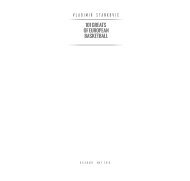Create successful ePaper yourself
Turn your PDF publications into a flip-book with our unique Google optimized e-Paper software.
Saint Nikola<br />
If someone were to ask me who were the best<br />
players ever from Zagreb, my answer would be Nikola<br />
Plecas (PLEH-chash), Mihovil Nakic and Zoran<br />
Cutura – in that order. Surprised? Where is Drazen<br />
Petrovic? And I would agree with you, but the catch<br />
is I am talking about players who left a big mark<br />
and were born or raised in Zagreb. Plecas was born<br />
on January 10, 1948 in Bruvno and arrived in Zagreb<br />
at age 6. He started his brilliant career there and, in<br />
fact, he still lives there, even if he is not very involved<br />
in basketball anymore. He’s from my generation and<br />
I admit a certain subjectivity towards him, but I do<br />
believe that the facts, numbers and witnesses justify<br />
his presence among the great players <strong>of</strong> the past.<br />
To introduce Plecas to the youngsters who were not<br />
lucky enough to see him in action, let me tell you a story<br />
about the first Korac Cup final in the 1971-72 season. FI-<br />
BA had established this competition to honor the great<br />
Serbian scorer Radivoj Korac, who passed way in a car<br />
crash on June 2, 1969. Only eight teams signed up: two<br />
from Spain (Manresa and Picadero JC), two from France<br />
(Olympique Antibes and Caen), two from Yugoslavia<br />
(Lokomotiva Zagreb and OKK Belgrade, Korac’s club <strong>of</strong><br />
origin), and one each from Germany (USC Munich) and<br />
Belgium (Standard Liege). The first final featured the two<br />
Yugoslav teams, and the format was a home-and-away<br />
two-game series. I was at the game played in the old<br />
Sports Palace <strong>of</strong> New Belgrade on February 29, 1972.<br />
OKK won 83-71 despite 29 points scored by Plecas for<br />
Lokomotiva Zagreb, the guests. On March 7, the second<br />
game was played in Zagreb. At the break, OKK was<br />
ahead, 48-40, which added up to a 20-point aggregate<br />
advantage with the 12 from the first game. <strong>Basketball</strong> is a<br />
collective sport, but that game turned into evidence that<br />
a single player can win a game by himself. Lokomotiva<br />
ended up winning the game, 94-73 (54-25 in the second<br />
half) and took the trophy! Plecas finished the game with<br />
40 points, most <strong>of</strong> them in the second half.<br />
Pero Zlatar, a prestigious Croatian journalist and<br />
president <strong>of</strong> Lokomotiva in the 1970s – before the<br />
club changed its name to Cibona, by the way – was the<br />
man who set the foundations <strong>of</strong> what would be one <strong>of</strong><br />
the great clubs in Europe in the following years. Zlatar<br />
wrote an article about Plecas in which he said:<br />
“At the break in the final against OKK Belgrade,<br />
aside from trailing by 8 points, Lokomotiva was about<br />
to fall into the abyss because Plecas already had four<br />
fouls. Despite all that, he stepped on the court like a lion<br />
and in just a few minutes, Lokomotiva scored 21 points,<br />
most <strong>of</strong> them by Plecas, and allowed only 1. Plecas<br />
made each and every shot, from every position. It was<br />
unforgettable.”<br />
Zlatar also assures us that during the 1970s, Nikola<br />
Plecas was the most popular sportsman in Zagreb, ahead<br />
<strong>of</strong> the aces from other sports – football included. He was<br />
an idol for the fans, who dubbed him “Saint Nikola”.<br />
Duo with Solman<br />
There may have been no humbler club in the world<br />
than Mladost <strong>of</strong> Zagreb, which produced two world<br />
champions and an Olympic champion, who also won<br />
several <strong>European</strong> titles at the club and national team<br />
levels. I am referring to Mihovil Nakic, Damir Solman<br />
and Nikola Plecas. The latter two played together there,<br />
as they were the same age, and together they caught<br />
the attention <strong>of</strong> the big clubs.<br />
<strong>101</strong> greats <strong>of</strong> european basketball<br />
Nikola Plecas<br />
P

















